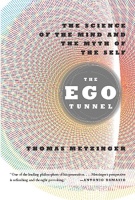Theories about what consciousness is tend to disintegrate into either hand-waving or mysticism. While Metzinger's attempt falls into the former category, he does manage to put up quite a good fight before going down: the goals he sets himself are the right ones, and when he finally does start to become vague it is only because empirical science hasn't yet reached that point.

The Ego Tunnel: The Science of the Mind and the Myth of the Self
Thomas Metzinger
ISBN: 9780465045679
ASIN: B06XC78RYY
Basic Books, 2009-03-17
English
Theories about what consciousness is tend to disintegrate into either hand-waving or mysticism. While Metzinger's attempt falls into the former category, he does manage to put up quite a good fight before going down after having exhausted empirical science's current knowledge. The book is quite a ride through that thing - whatever it is - you think you are. (5/5)
Metzinger's theory is that while we think of ourselves as some entity - a "self" - that inhabits a body, there is no such thing. Our brains create a model of the world that is so good that the brain is unable to treat it as anything but real. As an example: while you may see colors, the real world has no colors[1] - only various spectra of electromagnetic radiation that extend beyond the visible portion of the spectrum. The blue sky isn't "blue" in any objective way. The only thing we can say is that when you observe it, your brain creates the subjective experience of a blue sky. There is nothing we know of that forces the brain to create the subjective experience of "blue", as opposed to some other color, when faced with the particular spectrum of a daytime sky. But since the brain can't intuitively grasp that fact, we think that objects have color and that the sky is blue.
In the same way, the brain creates a model of the world from sensory data, and in this model of the world it places a model of the organism - the self-model. The brain is then unable to see this as a model it has created and believes it to be reality and this leads to subjective experiences. The brain creates the "ego tunnel" of the book's title - it is a tunnel through reality that we inhabit but are unable to recognize as something created in our minds. When we see something, we only see the image of the object in the ego tunnel. When we feel our hands, we only feel the self-model in the ego tunnel.
It is here that you start to see Metzinger's hands start to wave about. Because the obvious question is then how we explain subjective experiences, such as the color blue. Metzinger's explanation that subjective experience is a biological data format
[2] leads us to the question of what data formats - biological or not - lead to subjective experiences in the machinery that processes them, and what modes of subjective experiences are there? What makes blue just blue? Why do we perceive sound as just sound, when we could perceive fluctuating pressure as, for example, pressure, or maybe as something completely different? This is where Metzinger drops, almost as an afterthought, what I would say is this book's big bomb of a claim:
Very obviously, and in a strictly no-nonsense, non-metaphorical, and nonmysterious way, the physical universe itself possesses an intrinsic potential for the emergence of subjectivity.
— Location 672
Then he starts to wave his hands and ushers our attention back towards the ego tunnel - but for me, that was the sentence that stuck with me. Metzinger claims that subjective experiences are an intrinsic property of the universe we inhabit, and that blew my mind. I don't believe that there is some property of the universe that makes the subjective experience of vision just the way it is - or that the modes of subjective experience are analogous to, for example, the generations of particles in the standard model[a], which would leave us with the subjective experience of vision as being one of a fixed number of modalities that just happen to come included in the universe we inhabit. It could be that the subjective experience automatically adapts to the data it presents; yet I find the question of what constraints can be put on that adaptation and how it is realized to be just as vital in explaining what consciousness is.
This is where Metzinger runs out of steam. He explains consciousness by explaining why the brain doesn't think it is a brain, but the problem of consciousness is intertwined with the question of how subjective experiences arise as they are something we strongly associate with consciousness. Not covering that is a disappointment, albeit an understandable one.
Metzinger admits that this is a difficult question:
We may soon have a functionalist theory of consciousness, but this doesn't mean we will also be able to implement the functions this theory describes on a nonbiological carrier system. Artificial consciousness is not so much a theoretical problem in philosophy of mind as a technological challenge; the devil is in the details. The real problem lies in developing a non-neural kind of hardware with the right causal powers: Even a simplistic, minimal form of "synthetic phenomenology" may be hard to achieve - and for purely technical reasons.
— Location 2956
Ultimately, however, he chooses to not go there. Which is just as well - the strength of the book is not just in his asking the right questions and from the start setting the right criteria for potential answers; and since neuroscientific research hasn't given us any reliable clues yet, it is perhaps best to remain silent rather than to try filling the silence with wild guesses.
In summary, The Ego Tunnel is quite a ride through that thing - whatever it is - you think you are.